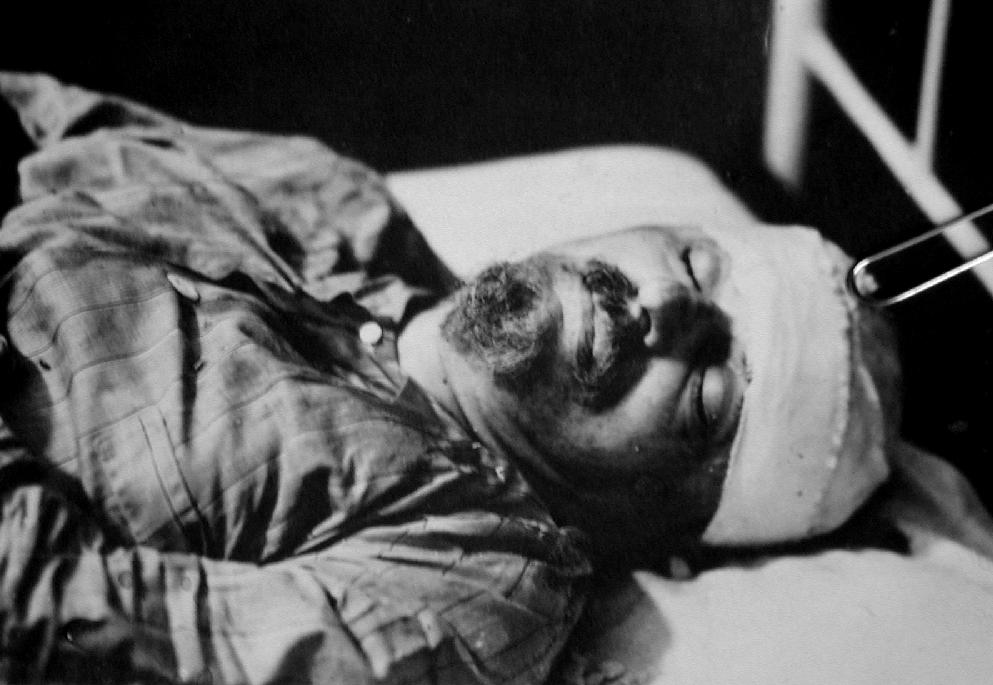 The war in Haiti, the invasion of that country by Canadian troops with UN sanction, was never about democracy or human rights but an attempt to put in power a state which would sanction privatization and protect foreign companies, such as Quebec based Gildan, and their cheap labour exploitation of the islands people.
The war in Haiti, the invasion of that country by Canadian troops with UN sanction, was never about democracy or human rights but an attempt to put in power a state which would sanction privatization and protect foreign companies, such as Quebec based Gildan, and their cheap labour exploitation of the islands people.
War is the lifeblood of Imperialism. Capitalism that moves beyond its national borders, globalization, is Imperialism. Canada and Quebec are imperialist powers in Haiti.
The Liberals sent a clear message last year with the appointment of Canada's new Governor General; Michaëlle Jean,
who was born in Haiti. That appointment sent a political message to Haiti, that we rule. Canada and Quebec (which has the largest Haitian exile population in North America), are the new Imperial governors of Haiti.
That is Canada's dirty little secret.
Justin Podur on Michael Deibert, Notes from the Last Testament. Untenable defence of Aristide’s overthrow, as Haiti’s poor come under siege from militias tacitly sanctioned by UN forces.
In the vast corrugated-iron shanty town of Cité Soleil, home to quarter of a million people, all the schools are shut down and the one hospital closed. White armoured un personnel carriers patrol the perimeter, half a dozen blue-helmeted heads poking out of the turret, automatic weapons trained on the streets. It is the masked units of the Police Nationale d’Haïti, bolstered by heavily armed irregulars from the officially disbanded Haitian army, who take the lead in the brutal raids into working-class neighbourhoods, but the Mission des Nations Unies pour la Stabilisation en Haïti—minustah—who back them up, blocking off exits as the pnh spread out through the area and the gunfire begins. In the poor districts of Port-au-Prince—La Saline, Bel Air—a 2004 human-rights investigation reported, such raids leave ‘dead bodies in the streets almost daily, including innocent bystanders, women and children, with the un forces visibly acting as support for, rather than a check on, the official violence’. One Québécois police officer attached to the un force complained that all he had done since getting to the island was ‘engage in daily guerrilla warfare’.
Welcome to Kofi Annan’s Haiti. It is two years since the un-backed Multinational Interim Force headed by the us, France and Canada toppled the constitutionally elected Lavalas government of Jean-Bertrand Aristide. The case for military intervention was based on claims of a possible ‘humanitarian catastrophe’ in the making, and the mandate hurriedly bestowed by the un, as Marines and Légionnaires clomped into the National Palace, was to ‘promote the protection of human rights’. France, Haiti’s former colonial master, had been the moving force behind the invasion. The Bush Administration, bogged down in Iraq, burnt by the failed coup against Chávez in 2002, and counting down to the 2004 election, was chary of another military engagement. Chirac and Villepin, keen to ingratiate themselves after the contretemps over Operation Iraqi Freedom, offered a bespoke package: unsc backing for a multilateral invasion force with guaranteed withdrawal in three months, to be replaced by a broader un mission. Chirac’s advisers, searching for a formula with which to discount Aristide’s claim that Paris should repay the millions it had once extorted from Haiti, had suggested that the bicentenary of the demi-island’s 1804 independence offered France the opportunity to ‘shed the weight which servitude imposes on the master’. It was a burden eagerly shouldered by Lula’s Brazil, Lagos’s Chile, Kirchner’s Argentina and others as, from June 2004, they replaced the initial France–us–Canada force in order to assist the ‘peaceful and constitutional political process’.
The privatizations and, especially, the agricultural tariff cuts of the
sap, unwillingly implemented, devastated the Haitian economy and alienated key sectors of Lavalas support. As agreed, Aristide stepped down in 1995. His successor as Lavalas presidential candidate, René Préval, won an easy victory in the 1995 election. But political tensions grew as living conditions worsened. In 1994 Aristide had disbanded but, disastrously, not disarmed the brutal
fadh, who immediately began to regroup against him, provoking a counter-militarization by some of Aristide’s supporters. Disputes over the economic programme split the Lavalas coalition, with Préval’s prime minister Rosny Smarth, a strong proponent of the
sap, and others forming the Organisation du Peuple en Lutte, and Aristide setting up Fanmi Lavalas, a personalized grouping with a strong pro-poor rhetoric. The Assembly was deadlocked. The
opl disputed
fl’s gains in the 1997 legislative elections; in the slums, the rivalries were played out at gang level. Punishment killings continued, though at a far lower level than during the dictatorship years. Among the senseless victims was Jean Dominique, seemingly killed for his sympathies with peasants protesting Lavalas policies, whose leaders had linked up with the
opl.
Officially, the turning-point for the campaign against Aristide was supposed to come with the May 2000 legislative elections: minor irregularities were alleged in the tallying of votes for the lower-order parties, which might have averted some second-round run-offs, though these would have had scant impact on the overall outcome. But Deibert’s narrative, broadly chronological from 2000 on, inadvertently lets a cat out of the bag: Convergence Démocratique, the alliance of rich businessmen, Duvalierists, opl and ex-Lavalas supporters that would henceforth coordinate the campaign for us intervention against Aristide, had denounced the election results even before the count began. It was not vote-tallying anomalies, but the clear prospect that Aristide and his supporters would legitimately sweep both the legislative and the presidential elections that year, and thus be in a position to implement even the minute redistribution of wealth implied in Aristide’s meek promise to ‘lift people out of absolute misery into poverty with dignity’, that was the motivating factor.
Peter Hallward: Option Zero in Haiti
A very multilateral coup. Franco-American harmony and unanimous blessings from the Security Council for the overthrow of a constitutional government and crushing of popular hope, in the Western hemisphere's poorest nation-state.
Globalization comes to Haiti
Predictably, the imf cure for Haiti’s desperate poverty involved further reductions in wages that had already sunk to starvation levels, privatization of the state sector, reorientation of domestic production in favour of cash crops popular in North American supermarkets and the elimination of import tariffs. It was the last of these, easiest to implement, that had the most immediate impact. With the tariff on rice cut from 50 per cent to the imf-decreed 3 per cent, Haiti—previously self-sufficient in the crop—was flooded with subsidized American grain, and rice imports rose from just 7,000 tonnes in 1985 to 220,000 tonnes in 2002. Domestic rice production has all but disappeared. A similar sequence eliminated Haiti’s poultry sector, at the cost of around 10,000 jobs. Haitian farmers tend to associate these developments with the most bitterly resented of all the international community’s many aggressive interventions in their domestic economy—the 1982 extermination, to allay the fears of American importers concerned by an outbreak of swine fever, of Haiti’s entire native pig population, and their subsequent replacement with animals from Iowa that required living conditions rather better than those enjoyed by most of the island’s human population.
As a result of these and related economic ‘reforms’, agricultural production fell from around 50 per cent of gdp in the late 1970s to just 25 per cent in the late 1990s. Structural adjustment was supposed to compensate for agrarian collapse with an expansion of the light manufacturing and assembly sector. The lowest wages in the hemisphere, backed by a virtual ban on trade unions, had encouraged mainly American companies or contractors to employ around 60,000 people in this sector in the late 1970s, and through to the mid-90s companies like Kmart and Walt Disney continued to pay Haitians around 11 cents an hour to make pyjamas and T-shirts. The companies benefit from tax exemptions lasting for up to 15 years, are free to repatriate all profits and obliged to make only minimal investments in equipment and infrastructure. By 1999, Haitians fortunate enough to work in the country’s small manufacturing and assembly sector were earning wages estimated at less than 20 per cent of 1981 levels. Nevertheless, still more dramatic rates of exploitation encouraged many of these companies to relocate to places like China and Bangladesh, and only around 20,000 people were still employed in the Port-au-Prince sweatshops by the end of the millennium. Real gdp per capita in 1999–2000 was estimated to be ‘substantially below’ the 1990 level.
It would be wrong to think that these reforms were implemented with anything approaching Third Way zeal. On the contrary, the Lavalas government was continually criticized for its ‘lack of vigour’ by international financial institutions: ‘Policies imposed as conditions by international lenders have been at best half-heartedly supported by the domestic authorities, and at worst violently rejected by the public’ With its back to the wall, Lavalas resorted to what James Scott has famously dubbed the ‘weapons of the weak’: a mixture of prevarication and evasive non-cooperation. This proved partially successful as a way of deflecting at least one of the main blows of structural adjustment, the privatization of Haiti’s few remaining public assets. Lavalas had good reason to drag its feet. When the state-run sugar mill was privatized in 1987, for example, it was bought by a single family who promptly closed it, laid off its staff and began importing cheaper sugar from the us so as to sell it on at prices that undercut the domestic market. Once the world’s most profitable sugar exporter, by 1995 Haiti was importing 25,000 tons of American sugar and most peasants could no longer afford to buy it. By contrast, in September 1995 Aristide dismissed his prime minister for preparing to sell the state-owned flour and cement mills without insisting on any of the progressive terms the imf had promised to honour—opening the sale to middle-class and diaspora participation, and ensuring that some of the money it earned was to go towards literacy, education and compensation for victims of the 1991 coup. Aristide could only delay the process for two years, however. In 1997 the flour mill was duly sold for just $9 million, at a time when its yearly profits were estimated at around $25 million per year.
The Lavalas government never yielded, however, to us pressure to privatize Haiti’s public utilities. At the same time, and with drastically limited resources, it oversaw the creation of more schools than in all the previous 190 years. It printed millions of literacy booklets and established hundreds of literacy centres, offering classes to more than 300,000 people; between 1990 and 2002 illiteracy fell from 61 to 48 per cent. With Cuban assistance, a new medical school was built and the rate of hiv infection—a legacy from the sex tourism industry of the 1970s and 80s—was frozen, with clinics and training programmes opened as part of a growing public campaign against aids. Significant steps were taken to limit the widespread exploitation of children. Aristide’s government increased tax contributions from the elite, and in 2003 it announced the doubling of a desperately inadequate minimum wage.
Find blog posts, photos, events and more off-site about:
Haiti, Arestide, Canada, UN, privatization, Gildan, Quebec, invasion,




 New York, October 11, 2005—The editor of a monthly magazine about women's rights went on trial today in Kabul's provincial court on blasphemy charges for publishing articles purported to offend Islam.
New York, October 11, 2005—The editor of a monthly magazine about women's rights went on trial today in Kabul's provincial court on blasphemy charges for publishing articles purported to offend Islam.



